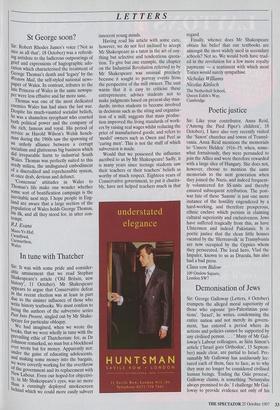In tune with Thatcher
Sir: It was with some pride and consider- able amusement that we read Stephan Shakespeare's article (`Old Britain, new history', 11 October). Mr Shakespeare a. Ppears to argue that Conservative defeat 111, the recent election was at least in part due to the sinister influence of those who write history textbooks. We must confess to being the authors of the subversive series Past Into Present, singled out by Mr Shake- speare for particular obloquy. We had imagined, when we wrote the books, that we were wholly in tune with the Prevailing ethic of Thatcherism: for, as Dr Johnson remarked, no man but a blockhead ever wrote but for money. Apparently not: under the guise of educating adolescents, and making some money into the bargain, we were covertly working for the overthrow of the government and its replacement with New Labour. Even our hoped-for objectivi- tY, in Mr Shakespeare's eyes, was no more than a cunningly deployed smokescreen behind which we could more easily subvert innocent young minds. Having read his article with some care, however, we do not feel inclined to accept Mr Shakespeare as a tutor in the art of any- thing but selective and tendentious quota- tion. To give but one example, the chapter on the Industrial Revolution referred to by Mr Shakespeare was unusual precisely because it sought to portray events from the perspective of the mill owners. The unit warns that it is easy to criticise these entrepreneurs; advises students not to make judgments based on present-day stan- dards; invites students to become involved in decisions such as the siting and organisa- tion of a mill; suggests that mass produc- tion improved the living standards of work- ers by raising real wages whilst reducing the price of manufactured goods; and refers to `model' owners such as Owen and Peel as `caring men'. This is not the stuff of which subversion is made.
Would that we possessed the influence ascribed to us by Mr Shakespeare! Sadly, it is many years since teenage students saw their teachers or their teachers' beliefs as worthy of much respect. Eighteen years of Conservative government, to put it charita- bly, have not helped teachers much in that regard.
Finally, whence does Mr Shakespeare obtain his belief that our textbooks are amongst the most widely used in secondary schools? Not so. We would both have trad- ed in the revolution for a few more royalty payments — a sentiment with which most Tories would surely sympathise.
Nicholas Williams Nicolas Kinloch
The Netherhall School, Queen Edith's Way, Cambridge


















































































 Previous page
Previous page